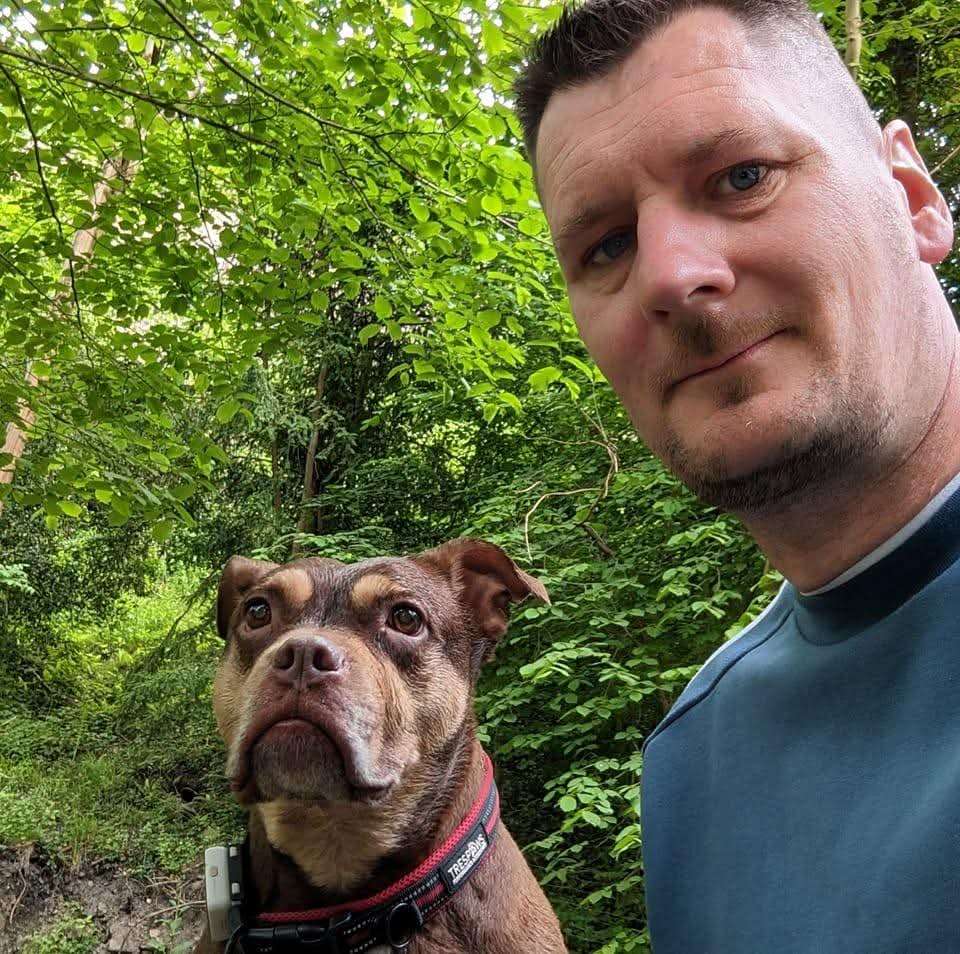Discover postsExplore captivating content and diverse perspectives on our Discover page. Uncover fresh ideas and engage in meaningful conversations
In memory of Lexi 11.5 years of love, loyalty, and laughter.
From the moment I held you, a wriggling pup,
Eyes full of wonder, your tail curled up,
I knew my world had changed that day,
You’d be the light to guide my way.
With every sunrise, through every mile,
You stayed beside me, made life worthwhile.
Not just a pet, but my soul’s own thread,
You listened in silence to words unsaid.
You learned the roads, the stops, the signs,
Every site and shift, those long drive lines.
Wherever work would call me to be,
You followed, fearless—right next to me.
Each job we did, you proudly shared,
With calm devotion, always prepared.
And those who met you on the way,
Will Still speak of Lexi everyday.
You weren’t just mine, you touched them too,
With your kind eyes and heart so true.
You brought the quiet joy they’d seek,
A wagging tail, a gentle cheek.
In cars & vans, on mountains high,
Through wind and rain, under any sky—
You watched, you waited, never far,
My little shadow, my North Star.
You saw me through the darkest hours,
My silent strength, my peace, my power.
When life felt heavy, love felt thin,
You'd nuzzle close and draw me in.
Through hardship, grief, and days gone wrong,
You gave me hope, you kept me strong.
I swear you knew, before I spoke,
And wrapped me in the love you woke.
You had no words, yet somehow knew,
Just what to say, just what to do.
Your loyalty—a quiet flame,
That never flickered, never changed.
But tonight, my girl, I let you go,
Though every part of me says no.
I held you close, I kissed your face,
And watched you drift to what we believe is a better place.
The silence now is sharp and cold,
The leash hangs still, your bed feels old.
Life won’t be the same without you near—
No bark, no breath, no Lexi here.
But in the wind, I’ll hear your call,
In dreams, you’ll chase that bouncing ball.
In every step, you’ll walk with me,
Forever part of my memory.
No more pain, no more to fight,
Just open fields and morning light.
You earned your peace, your gentle rest,
You gave your all—you gave your best.
So run now, Lexi, run so free,
Past gates of gold, by Heaven’s tree.
Wait for me there, by star or stream,
My clever girl, my sweetest dream.
Until we meet again, my friend,
Where love goes on, and time can’t end.
I’ll carry you in heart and mind—
My once-in-a-lifetime, one-of-a-kind friend.


 +6
+6
In memory of Lexi 11.5 years of love, loyalty, and laughter.
From the moment I held you, a wriggling pup,
Eyes full of wonder, your tail curled up,
I knew my world had changed that day,
You’d be the light to guide my way.
With every sunrise, through every mile,
You stayed beside me, made life worthwhile.
Not just a pet, but my soul’s own thread,
You listened in silence to words unsaid.
You learned the roads, the stops, the signs,
Every site and shift, those long drive lines.
Wherever work would call me to be,
You followed, fearless—right next to me.
Each job we did, you proudly shared,
With calm devotion, always prepared.
And those who met you on the way,
Will Still speak of Lexi everyday.
You weren’t just mine, you touched them too,
With your kind eyes and heart so true.
You brought the quiet joy they’d seek,
A wagging tail, a gentle cheek.
In cars & vans, on mountains high,
Through wind and rain, under any sky—
You watched, you waited, never far,
My little shadow, my North Star.
You saw me through the darkest hours,
My silent strength, my peace, my power.
When life felt heavy, love felt thin,
You'd nuzzle close and draw me in.
Through hardship, grief, and days gone wrong,
You gave me hope, you kept me strong.
I swear you knew, before I spoke,
And wrapped me in the love you woke.
You had no words, yet somehow knew,
Just what to say, just what to do.
Your loyalty—a quiet flame,
That never flickered, never changed.
But tonight, my girl, I let you go,
Though every part of me says no.
I held you close, I kissed your face,
And watched you drift to what we believe is a better place.
The silence now is sharp and cold,
The leash hangs still, your bed feels old.
Life won’t be the same without you near—
No bark, no breath, no Lexi here.
But in the wind, I’ll hear your call,
In dreams, you’ll chase that bouncing ball.
In every step, you’ll walk with me,
Forever part of my memory.
No more pain, no more to fight,
Just open fields and morning light.
You earned your peace, your gentle rest,
You gave your all—you gave your best.
So run now, Lexi, run so free,
Past gates of gold, by Heaven’s tree.
Wait for me there, by star or stream,
My clever girl, my sweetest dream.
Until we meet again, my friend,
Where love goes on, and time can’t end.
I’ll carry you in heart and mind—
My once-in-a-lifetime, one-of-a-kind friend.

In memory of Lexi 11.5 years of love, loyalty, and laughter.
From the moment I held you, a wriggling pup,
Eyes full of wonder, your tail curled up,
I knew my world had changed that day,
You’d be the light to guide my way.
With every sunrise, through every mile,
You stayed beside me, made life worthwhile.
Not just a pet, but my soul’s own thread,
You listened in silence to words unsaid.
You learned the roads, the stops, the signs,
Every site and shift, those long drive lines.
Wherever work would call me to be,
You followed, fearless—right next to me.
Each job we did, you proudly shared,
With calm devotion, always prepared.
And those who met you on the way,
Will Still speak of Lexi everyday.
You weren’t just mine, you touched them too,
With your kind eyes and heart so true.
You brought the quiet joy they’d seek,
A wagging tail, a gentle cheek.
In cars & vans, on mountains high,
Through wind and rain, under any sky—
You watched, you waited, never far,
My little shadow, my North Star.
You saw me through the darkest hours,
My silent strength, my peace, my power.
When life felt heavy, love felt thin,
You'd nuzzle close and draw me in.
Through hardship, grief, and days gone wrong,
You gave me hope, you kept me strong.
I swear you knew, before I spoke,
And wrapped me in the love you woke.
You had no words, yet somehow knew,
Just what to say, just what to do.
Your loyalty—a quiet flame,
That never flickered, never changed.
But tonight, my girl, I let you go,
Though every part of me says no.
I held you close, I kissed your face,
And watched you drift to what we believe is a better place.
The silence now is sharp and cold,
The leash hangs still, your bed feels old.
Life won’t be the same without you near—
No bark, no breath, no Lexi here.
But in the wind, I’ll hear your call,
In dreams, you’ll chase that bouncing ball.
In every step, you’ll walk with me,
Forever part of my memory.
No more pain, no more to fight,
Just open fields and morning light.
You earned your peace, your gentle rest,
You gave your all—you gave your best.
So run now, Lexi, run so free,
Past gates of gold, by Heaven’s tree.
Wait for me there, by star or stream,
My clever girl, my sweetest dream.
Until we meet again, my friend,
Where love goes on, and time can’t end.
I’ll carry you in heart and mind—
My once-in-a-lifetime, one-of-a-kind friend.

In memory of Lexi 11.5 years of love, loyalty, and laughter.
From the moment I held you, a wriggling pup,
Eyes full of wonder, your tail curled up,
I knew my world had changed that day,
You’d be the light to guide my way.
With every sunrise, through every mile,
You stayed beside me, made life worthwhile.
Not just a pet, but my soul’s own thread,
You listened in silence to words unsaid.
You learned the roads, the stops, the signs,
Every site and shift, those long drive lines.
Wherever work would call me to be,
You followed, fearless—right next to me.
Each job we did, you proudly shared,
With calm devotion, always prepared.
And those who met you on the way,
Will Still speak of Lexi everyday.
You weren’t just mine, you touched them too,
With your kind eyes and heart so true.
You brought the quiet joy they’d seek,
A wagging tail, a gentle cheek.
In cars & vans, on mountains high,
Through wind and rain, under any sky—
You watched, you waited, never far,
My little shadow, my North Star.
You saw me through the darkest hours,
My silent strength, my peace, my power.
When life felt heavy, love felt thin,
You'd nuzzle close and draw me in.
Through hardship, grief, and days gone wrong,
You gave me hope, you kept me strong.
I swear you knew, before I spoke,
And wrapped me in the love you woke.
You had no words, yet somehow knew,
Just what to say, just what to do.
Your loyalty—a quiet flame,
That never flickered, never changed.
But tonight, my girl, I let you go,
Though every part of me says no.
I held you close, I kissed your face,
And watched you drift to what we believe is a better place.
The silence now is sharp and cold,
The leash hangs still, your bed feels old.
Life won’t be the same without you near—
No bark, no breath, no Lexi here.
But in the wind, I’ll hear your call,
In dreams, you’ll chase that bouncing ball.
In every step, you’ll walk with me,
Forever part of my memory.
No more pain, no more to fight,
Just open fields and morning light.
You earned your peace, your gentle rest,
You gave your all—you gave your best.
So run now, Lexi, run so free,
Past gates of gold, by Heaven’s tree.
Wait for me there, by star or stream,
My clever girl, my sweetest dream.
Until we meet again, my friend,
Where love goes on, and time can’t end.
I’ll carry you in heart and mind—
My once-in-a-lifetime, one-of-a-kind friend.

In memory of Lexi 11.5 years of love, loyalty, and laughter.
From the moment I held you, a wriggling pup,
Eyes full of wonder, your tail curled up,
I knew my world had changed that day,
You’d be the light to guide my way.
With every sunrise, through every mile,
You stayed beside me, made life worthwhile.
Not just a pet, but my soul’s own thread,
You listened in silence to words unsaid.
You learned the roads, the stops, the signs,
Every site and shift, those long drive lines.
Wherever work would call me to be,
You followed, fearless—right next to me.
Each job we did, you proudly shared,
With calm devotion, always prepared.
And those who met you on the way,
Will Still speak of Lexi everyday.
You weren’t just mine, you touched them too,
With your kind eyes and heart so true.
You brought the quiet joy they’d seek,
A wagging tail, a gentle cheek.
In cars & vans, on mountains high,
Through wind and rain, under any sky—
You watched, you waited, never far,
My little shadow, my North Star.
You saw me through the darkest hours,
My silent strength, my peace, my power.
When life felt heavy, love felt thin,
You'd nuzzle close and draw me in.
Through hardship, grief, and days gone wrong,
You gave me hope, you kept me strong.
I swear you knew, before I spoke,
And wrapped me in the love you woke.
You had no words, yet somehow knew,
Just what to say, just what to do.
Your loyalty—a quiet flame,
That never flickered, never changed.
But tonight, my girl, I let you go,
Though every part of me says no.
I held you close, I kissed your face,
And watched you drift to what we believe is a better place.
The silence now is sharp and cold,
The leash hangs still, your bed feels old.
Life won’t be the same without you near—
No bark, no breath, no Lexi here.
But in the wind, I’ll hear your call,
In dreams, you’ll chase that bouncing ball.
In every step, you’ll walk with me,
Forever part of my memory.
No more pain, no more to fight,
Just open fields and morning light.
You earned your peace, your gentle rest,
You gave your all—you gave your best.
So run now, Lexi, run so free,
Past gates of gold, by Heaven’s tree.
Wait for me there, by star or stream,
My clever girl, my sweetest dream.
Until we meet again, my friend,
Where love goes on, and time can’t end.
I’ll carry you in heart and mind—
My once-in-a-lifetime, one-of-a-kind friend.






